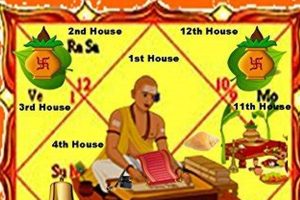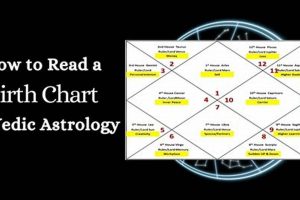This ancient Indian system of celestial divination, rooted in the Vedas, utilizes planetary positions and other celestial phenomena to understand earthly events and human lives. It provides a framework for interpreting personality traits, predicting future trends, and offering guidance on important life decisions, from career choices to relationship compatibility. An example application involves creating a birth chart based on the precise time and location of one’s birth, which serves as a blueprint for understanding an individual’s karmic predispositions and potential life path.
Practitioners value this system for its potential to offer self-awareness, foresight, and a deeper understanding of one’s purpose. Historically integral to Indian culture, it continues to offer a framework for navigating life’s complexities, offering insights into both challenges and opportunities. Its enduring relevance stems from its holistic approach, which considers the interconnectedness of cosmic influences and individual lives.
Further exploration of specific aspects of this practice, such as planetary influences, house systems, and predictive techniques, will provide a more comprehensive understanding of its intricacies and applications. Examining these components will illuminate its potential to offer valuable insights into individual lives and the broader human experience.
Tips for Utilizing Astrological Insights
These suggestions offer guidance on approaching astrological consultations and integrating the insights gained into daily life. These recommendations aim to empower individuals to utilize this ancient wisdom effectively.
Tip 1: Approach Consultations with Specific Questions: Instead of seeking general predictions, formulate clear, focused questions regarding specific life areas. This allows practitioners to provide more targeted and relevant guidance.
Tip 2: Understand the Limitations: Astrology offers potential insights, not definitive pronouncements. It should be viewed as a tool for self-discovery and guidance, not a rigid predictor of fate. Free will and personal actions remain paramount.
Tip 3: Verify Practitioner Credentials: Thorough research and verification of a practitioner’s experience and qualifications are crucial. Seek referrals and testimonials to ensure credibility.
Tip 4: Focus on Self-Improvement, Not Just Predictions: Utilize astrological insights to identify potential challenges and opportunities for growth. Focus on leveraging these insights to develop positive habits and make informed decisions.
Tip 5: Integrate Insights with Practical Action: Astrology should complement, not replace, practical efforts. Combine insights with real-world action to manifest desired outcomes.
Tip 6: Be Open to Interpretation: Astrological interpretations can vary. Be receptive to different perspectives and seek second opinions if necessary. Ultimately, personal resonance with the insights received is key.
Tip 7: Maintain a Balanced Perspective: Avoid over-reliance on astrological guidance. Maintain a balanced approach to life, integrating astrological insights with rational thinking and practical considerations.
By following these guidelines, individuals can navigate the complexities of astrological consultations and integrate the insights received into their lives meaningfully. This empowers them to harness the wisdom of this ancient tradition for personal growth and well-being.
These tips offer a foundation for effectively engaging with astrological guidance. The subsequent conclusion will summarize the core principles and encourage further exploration of this rich and complex field.
1. Vedic Wisdom
Vedic Wisdom forms the philosophical bedrock of this ancient astrological system. Originating from the Vedas, ancient Indian scriptures, this system inherits a profound worldview encompassing concepts like karma, dharma, and reincarnation. These concepts provide a framework for understanding the cause and effect relationship between celestial events and human experience. The Vedas posit a cosmic order governing the universe, and this astrological tradition seeks to interpret this order to gain insights into individual lives. For instance, the concept of karma, central to Vedic thought, explains how past actions influence present circumstances, a principle reflected in the astrological analysis of past life influences and karmic patterns.
The importance of Vedic Wisdom as a component of this astrological system lies in its ability to provide context and meaning to astrological interpretations. Without this philosophical foundation, astrological readings could be reduced to mere predictions. Vedic Wisdom elevates the practice by integrating it into a broader spiritual and philosophical framework. This allows for a deeper understanding of not only what might happen but also why, and what lessons can be learned. Practically speaking, this understanding can empower individuals to take responsibility for their actions and make choices aligned with their dharma, or life purpose. For example, understanding the karmic implications of a challenging planetary transit can motivate one to address unresolved issues and make positive changes.
In conclusion, Vedic Wisdom serves as the cornerstone of this ancient system. It provides the philosophical framework that allows for a deeper understanding of the interconnectedness between cosmic influences and human lives. By integrating these principles, individuals can move beyond mere predictions and gain valuable insights into their karmic patterns, life purpose, and potential for growth. This holistic approach allows for a more meaningful and transformative application of astrological wisdom in navigating life’s complexities.
2. Planetary Influences
Planetary influences form a cornerstone of Jyotish Vedic Astrology. This system posits that celestial bodies exert distinct energetic influences on human lives, shaping personality traits, influencing life events, and guiding karmic pathways. Understanding these influences is crucial for interpreting birth charts and making predictions. Each planet embodies specific qualities and archetypal energies, which interact with individual birth charts to create unique life experiences.
- The Luminaries: Sun and Moon
The Sun and Moon, considered luminaries in this system, represent core aspects of the self. The Sun signifies vitality, self-expression, and the conscious mind, while the Moon governs emotions, intuition, and the subconscious. For example, a prominent Sun placement might suggest a natural inclination towards leadership, while a strong Moon influence could indicate heightened sensitivity and emotional depth. Their positions in a birth chart provide insights into one’s core identity and emotional nature.
- Inner Planets: Mercury, Venus, and Mars
Mercury, Venus, and Mars, known as the inner planets, influence communication, relationships, and action, respectively. Mercury governs intellect and communication style, Venus influences love, beauty, and artistic expression, while Mars governs energy, drive, and assertiveness. Someone with a strong Mercury influence might excel in fields requiring communication and analytical skills, while a prominent Venus could indicate artistic talent or a strong focus on relationships. Mars’ placement can reveal insights into how one asserts oneself and pursues goals. These planetary influences shape how individuals interact with the world and express themselves.
- Outer Planets: Jupiter and Saturn
Jupiter and Saturn, the outer planets within the traditional framework, represent expansion and limitation. Jupiter governs luck, wisdom, and higher learning, while Saturn governs discipline, responsibility, and karmic lessons. A well-placed Jupiter can bring opportunities for growth and expansion, while Saturn’s influence often manifests as challenges and life lessons that foster maturity and resilience. Their positions in a birth chart can reveal areas of life where one might experience either ease or difficulty.
- Shadow Planets: Rahu and Ketu
Rahu and Ketu, often referred to as shadow planets or lunar nodes, represent points of karmic intersection. Rahu symbolizes ambition, desire, and material pursuits, while Ketu signifies detachment, spirituality, and past-life influences. Rahu’s placement can indicate areas of intense focus and desire, while Ketu’s position can reveal areas requiring letting go and spiritual growth. Understanding their influences is essential for interpreting karmic patterns and navigating life’s challenges.
Analyzing these planetary influences within the context of a birth chart provides a nuanced understanding of individual strengths, weaknesses, and karmic predispositions. This understanding forms the basis for making predictions, offering guidance, and suggesting remedial measures in Jyotish Vedic Astrology. The interplay of these planetary energies creates the complex tapestry of individual lives, shaping experiences and influencing destinies.
3. Birth Charts (Kundli)
Birth charts, known as Kundli in Sanskrit, serve as the foundational blueprint within Jyotish Vedic Astrology. A Kundli is a celestial snapshot of the planetary positions at the precise moment of an individual’s birth. This intricate map forms the basis for astrological analysis, providing a personalized cosmic roadmap that outlines potential life paths, personality traits, karmic influences, and significant life events. The Kundli’s importance stems from the core principle of this system, which posits a direct correlation between celestial alignments and earthly experiences. The birth chart acts as the bridge connecting these two realms, providing a framework for understanding how cosmic energies influence individual destinies. For instance, the specific placement of planets within the twelve houses of a Kundli offers insights into various life areas, from career and finances to relationships and health. A person born with Jupiter in the second house, associated with wealth, might be predisposed to financial prosperity, whereas Saturn in the same house might suggest financial challenges and the need for disciplined money management.
Further analysis of the Kundli involves examining the relationships between planets, known as aspects. These planetary interactions add layers of complexity to the interpretation, revealing potential harmonies or conflicts within an individual’s life. For example, a harmonious aspect between Venus and Jupiter might indicate opportunities for love, abundance, and artistic expression, while a challenging aspect between Mars and Saturn could suggest struggles with assertiveness, discipline, or limitations. Moreover, the Kundli serves as a tool for predictive astrology, allowing practitioners to forecast potential future trends based on planetary transits and cycles. This predictive capacity enables individuals to anticipate potential challenges and opportunities, empowering them to make informed decisions and navigate life’s complexities with greater awareness. A practical application of this predictive capacity involves analyzing upcoming planetary transits to anticipate potential career changes, relationship shifts, or health concerns.
In summary, the Kundli is an indispensable tool within Jyotish Vedic Astrology. It provides a personalized cosmic map that reveals an individual’s karmic predispositions, potential life paths, and the interplay of planetary influences shaping their destiny. Understanding the intricacies of a birth chart empowers individuals to gain self-awareness, anticipate future trends, and make choices aligned with their unique cosmic blueprint. While the Kundli offers valuable insights, it’s crucial to remember that free will and personal actions play a significant role in shaping one’s life. Jyotish Vedic Astrology, through the Kundli, offers guidance and understanding, but it doesn’t dictate a fixed fate. The system emphasizes the interplay of destiny and free will, encouraging individuals to utilize astrological insights as a tool for self-discovery and empowerment rather than a rigid predictor of the future.
4. Predictive Techniques
Predictive techniques constitute a core component of Jyotish Vedic Astrology, offering a framework for anticipating potential future trends and life events. These techniques leverage the principles of planetary influences, transits, and cycles to project how celestial movements might interact with an individual’s birth chart. Cause and effect form the basis of these predictive methods. Planetary positions at the time of birth establish a karmic blueprint, while subsequent planetary transits and cycles are believed to trigger specific events or life phases. The importance of predictive techniques lies in their potential to offer foresight, allowing individuals to anticipate challenges, capitalize on opportunities, and navigate life’s complexities with greater awareness. For example, the transit of Saturn over the natal Moon, known as Sade Sati, is often associated with a period of challenges and karmic lessons. Understanding this transit can help individuals prepare for potential difficulties and adopt coping strategies to mitigate negative impacts. Another predictive tool, Dasha systems, calculates planetary periods that govern specific life phases, providing insights into the timing of major life events related to career, relationships, or health.
Further analysis involves considering various predictive methodologies, including transits, dashas, annual charts (Varshaphal), and progressed charts. Transits analyze the ongoing movement of planets through the zodiac and their impact on natal planetary positions. Dasha systems provide a timeline for planetary influences based on specific calculations. Varshaphal charts offer insights into the year ahead, while progressed charts reveal the unfolding of karmic patterns over time. A practical application of these techniques involves analyzing upcoming planetary transits to anticipate potential career changes, relationship shifts, or health concerns. Dasha analysis can provide insights into the timing of favorable periods for pursuing new ventures or making important life decisions. For instance, a favorable Jupiter Dasha might indicate a period of growth, prosperity, and opportunities for expansion. Combining these predictive tools allows astrologers to provide personalized guidance and insights based on individual birth charts and current celestial alignments.
Predictive techniques offer a powerful framework for gaining insights into potential future trends. However, it’s crucial to acknowledge the complexities and limitations inherent in astrological predictions. While these techniques can provide valuable foresight, they do not dictate a fixed fate. Free will and personal actions play a crucial role in shaping individual experiences. Jyotish Vedic Astrology emphasizes the interplay of destiny and free will, suggesting that while certain karmic predispositions exist, individuals possess the agency to navigate their lives and make choices aligned with their highest potential. The goal of predictive astrology is not to foster fatalism, but to empower individuals with self-awareness and foresight, enabling them to navigate life’s journey with greater understanding and resilience.
5. Remedial Measures
Remedial measures, an integral aspect of Jyotish Vedic Astrology, address potential challenges indicated within a birth chart. These measures aim to mitigate negative planetary influences and enhance positive ones, aligning an individual’s life with their highest potential. This practice acknowledges the interplay of free will and destiny, empowering individuals to navigate karmic predispositions and create positive change. Remedial measures are not about escaping fate, but about utilizing astrological insights to navigate life’s complexities with greater awareness and resilience. They offer a framework for harmonizing the self with cosmic influences, fostering greater well-being and spiritual growth.
- Gemstone Therapy
Gemstone therapy utilizes specific gemstones to harness planetary energies and balance potential imbalances. Certain gemstones are associated with specific planets; wearing a recommended gemstone can strengthen a benefic planetary influence or mitigate a malefic one. For instance, wearing a yellow sapphire is often recommended to enhance the positive effects of Jupiter, while a blue sapphire might be suggested to mitigate the negative influence of Saturn. This practice aims to harmonize an individual’s energy field with specific planetary vibrations, promoting well-being and alleviating potential challenges.
- Mantra Recitation
Mantra recitation involves chanting specific sound vibrations to invoke planetary deities and attune oneself to their energies. Each planet has associated mantras believed to channel positive vibrations and mitigate negative influences. Repeating a mantra dedicated to Mars, for example, might be recommended to enhance courage and energy levels, while chanting a mantra for Mercury could improve communication and mental clarity. This practice aims to connect individuals with the subtle energies of the planets, fostering inner harmony and spiritual growth.
- Ritualistic Practices (Yagyas)
Yagyas, ancient Vedic fire ceremonies, are performed to invoke specific deities and address particular karmic challenges. These rituals involve offerings and chanting of mantras, creating a sacred space for invoking divine blessings and mitigating negative planetary influences. Performing a Yagya dedicated to a specific planet aims to appease its energy and mitigate potential negative effects. For instance, a Yagya for Rahu might be recommended to alleviate obstacles and challenges related to ambition and desire. These ceremonies aim to harmonize individual energies with cosmic forces, promoting spiritual growth and well-being.
- Charity and Service (Dana)
Charity and selfless service, known as Dana in Sanskrit, are considered powerful remedial measures in Jyotish Vedic Astrology. Performing acts of charity or engaging in selfless service related to a specific planet’s signification can mitigate negative influences. For example, donating food to the needy might be recommended to appease Jupiter, while serving the elderly could mitigate the negative effects of Saturn. This practice aims to cultivate compassion and generate positive karma, harmonizing the individual with the cosmic order.
These remedial measures, while distinct, are often integrated to create a holistic approach to addressing karmic imbalances and enhancing positive planetary influences. By combining gemstone therapy, mantra recitation, ritualistic practices, and charitable acts, Jyotish Vedic Astrology offers a multifaceted approach to self-improvement and spiritual growth. It’s essential to consult with a qualified practitioner to determine the most appropriate remedial measures based on an individual’s unique birth chart and specific life circumstances. The effectiveness of these measures relies not only on the prescribed practices but also on the individual’s intention, sincerity, and commitment to positive change. Ultimately, remedial measures empower individuals to actively participate in shaping their destinies, navigating life’s challenges with greater resilience and aligning their lives with their highest potential.
6. Karmic Framework
The karmic framework forms an integral foundation within Jyotish Vedic Astrology, providing a context for understanding the cause-and-effect relationship between past actions and present circumstances. This system posits that present life experiences are shaped by past karma, both from this life and previous ones. The birth chart, or Kundli, serves as a karmic map, reflecting the accumulated karmic patterns an individual brings into this life. Planetary placements and astrological combinations within the birth chart offer insights into these patterns, revealing potential strengths, weaknesses, and life lessons. For example, Saturn, often associated with karmic debts and life lessons, might indicate areas where challenges and restrictions are likely to manifest due to past actions. Conversely, Jupiter, representing blessings and opportunities, could signify areas where positive karma from past lives might manifest as good fortune or ease.
This understanding of the karmic framework adds depth and meaning to astrological interpretations. It moves beyond mere predictions and offers a framework for self-awareness and personal growth. By understanding the karmic influences shaping their lives, individuals can gain insights into recurring patterns, unresolved issues, and potential life lessons. This awareness empowers them to take responsibility for their actions and make choices aligned with their spiritual evolution. For instance, recognizing a challenging karmic pattern related to relationships might motivate someone to address unhealthy relationship dynamics and cultivate greater emotional intelligence. Practically speaking, integrating the karmic framework into astrological consultations can facilitate deeper self-reflection and motivate positive change.
The karmic framework within Jyotish Vedic Astrology offers a profound perspective on the interconnectedness of past, present, and future. It suggests that present circumstances are not random events but rather reflections of past actions. This understanding empowers individuals to take ownership of their lives and make conscious choices to create a more positive future. While acknowledging the influence of past karma, the system also emphasizes the power of free will. Jyotish Vedic Astrology doesn’t promote fatalism but rather encourages individuals to utilize astrological insights as a tool for self-discovery, growth, and ultimately, the fulfillment of their karmic potential. This integration of karmic understanding and astrological analysis provides a comprehensive framework for navigating life’s complexities and striving towards greater self-awareness and spiritual evolution.
Frequently Asked Questions
This section addresses common inquiries regarding this ancient astrological system, aiming to provide clear and informative responses.
Question 1: How does this system differ from Western astrology?
This system utilizes a sidereal zodiac based on the fixed constellations, while Western astrology employs a tropical zodiac based on the equinoxes. This fundamental difference results in varying zodiac signs and planetary placements. Additionally, this system places greater emphasis on karmic influences, lunar mansions (Nakshatras), and remedial measures.
Question 2: Is fate predetermined according to this system?
While this system acknowledges karmic influences and predispositions, it also emphasizes free will and the potential for personal growth. Astrological insights are not viewed as fixed pronouncements but rather as a tool for understanding potential challenges and opportunities, empowering individuals to make informed choices. This approach underscores that individuals possess agency in shaping their own lives.
Question 3: What is the significance of a birth chart?
A birth chart, or Kundli, serves as a personalized cosmic map based on the precise time, date, and location of one’s birth. It provides insights into personality traits, karmic influences, potential life paths, and significant life events. It acts as a framework for understanding how planetary energies interact with an individual’s life.
Question 4: What are remedial measures in this system?
Remedial measures, including gemstone recommendations, mantra recitation, and ritualistic practices, aim to mitigate negative planetary influences and enhance positive ones. These measures are not about changing fate but rather about harmonizing one’s life with cosmic energies and fostering greater well-being.
Question 5: How can one find a qualified practitioner?
Thorough research and referrals are crucial when seeking a qualified practitioner. Look for practitioners with demonstrable experience, credible certifications, and a strong understanding of the philosophical principles underlying this system. Personal recommendations and testimonials can also provide valuable insights into a practitioner’s expertise.
Question 6: Is it necessary to consult an astrologer regularly?
The frequency of consultations depends on individual needs and preferences. While some individuals may find value in regular consultations, others may seek guidance only during significant life transitions or specific challenges. Ultimately, the decision to consult an astrologer and the frequency of consultations should be based on personal discernment.
These responses offer foundational insights into common inquiries regarding this complex astrological system. Further research and exploration can provide a more comprehensive understanding of its principles and applications.
The following section will offer a conclusion to this exploration of Jyotish Vedic Astrology.
Conclusion
This exploration of Jyotish Vedic Astrology has delved into its core components, from the philosophical underpinnings of Vedic Wisdom to the practical applications of predictive techniques and remedial measures. The significance of planetary influences, the intricacies of birth charts, and the karmic framework provide a comprehensive understanding of this ancient system’s depth and complexity. This exploration has highlighted its potential to offer valuable insights into individual lives and the broader human experience. Understanding its principles and applications allows for a more nuanced appreciation of its potential benefits and limitations.
Jyotish Vedic Astrology offers a profound lens through which to examine life’s journey. Its enduring relevance stems from its capacity to provide guidance, foster self-awareness, and empower individuals to navigate life’s complexities with greater understanding. Further exploration and thoughtful engagement with this rich tradition can yield valuable insights into the interconnectedness of cosmic influences and human lives, encouraging a deeper understanding of one’s unique place within the universe. Its potential to empower individuals to align with their highest potential and live more fulfilling lives remains its most compelling contribution.







